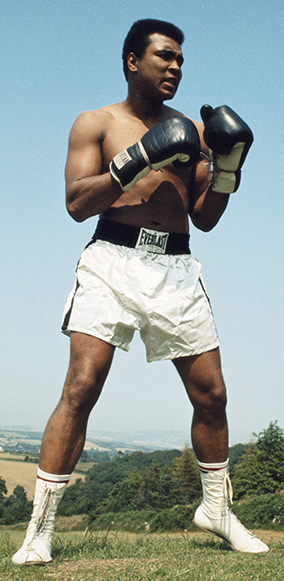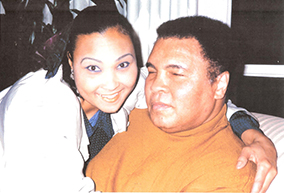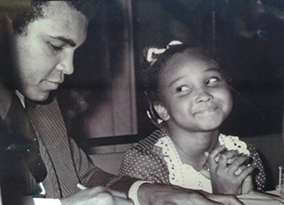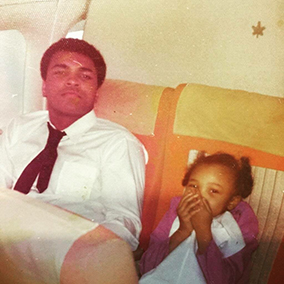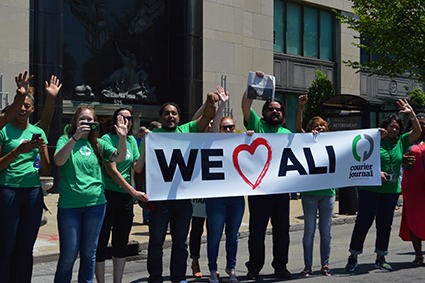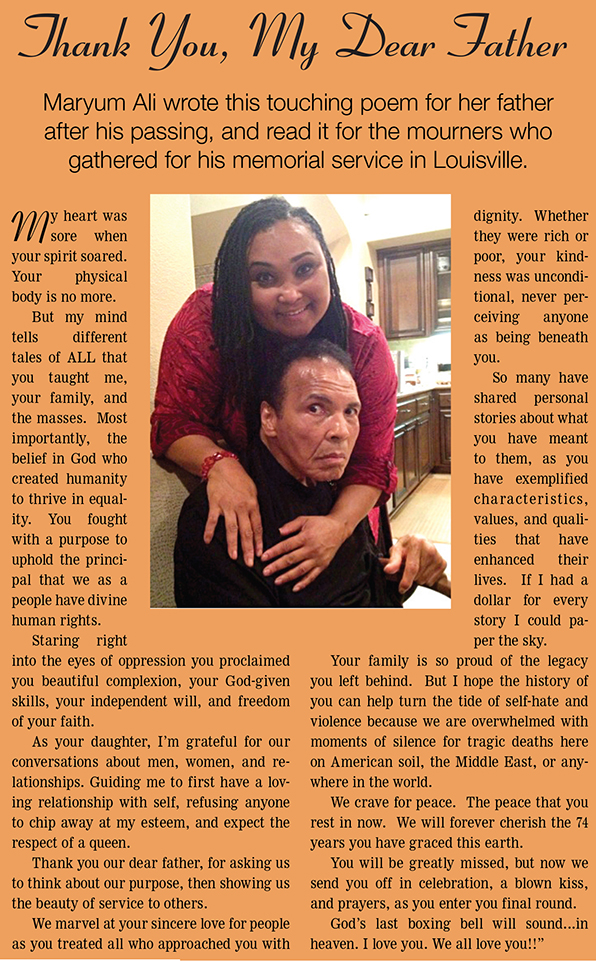‘The thread of equality ties his life’s journey together’
July 11, 2016 by Las Vegas Black Image Magazine
Filed under Cover Story, Feature, Photos
QUESTIONS & ANSWERS | MARYUM “MAY MAY” ALI
Muhammad Ali’s daughter, reflects on her father’s iconic life and how her family — and the world — said goodbye.
The Greatest has gone on to his great reward. Muhammad Ali died on June 3, but his legacy as an athlete, cultural icon and humanitarian will live on through the ages. Las Vegas Black Image Magazine sat down with his eldest daughter, Maryum “May May” Ali, for a wide-ranging conversation about her father’s life, his relationship with his nine children, and the global outpouring of emotion that followed his passing.
What is your father’s greatest legacy?
I would say that it is standing up for people who are not perceived as equals. That was really the foundation of everything he did. He used his fame and talent to champion human rights for people. We are all created equal — we are just not treated equally. I think that the thread of equality ties his life’s journey together. If African-Americans and people in general lived in a world that provided equal opportunity and human rights, my father’s narrative would have been very different, which is why I consider that his most important legacy.
Tell me about the recent documentary you participated in about your dad?
My sister Hana and I consulted on the documentary film by Clare Lewins called “I Am Ali.” Clare wanted to include some of my father’s personal tape recordings between him and his children in this documentary. This is only film that gave attention to the details of Muhammad Ali as a father, who is the most documented person in history. However, there are very few films about his relationship with his children. My siblings and I have been in several documentaries, but the film “I Am Ali” authentically captures Ali and fatherhood. So, once Clare heard about the tape recordings, she wanted to make it the focal point of the film. This is why this film is very special to us as a family.
What is your most memorable moments with your dad as a child?
My most memorable moments with my father were the spiritual moments. I loved praying with him, going to Islamic services at the mosque with him. We had long talks about the purpose of our lives and the importance of exercising our spiritual muscles to avoid the pitfalls of the material world we live in. These are my favorite moments with my dad, because I knew they were moments that would sustain me as a human being. The knowledge from these conversations would protect me. No man is perfect,
not even Ali, but what I respect about my father is his consistent mission of becoming a better person. He always acknowledged his faults and failures, but he would say, “This is what I need to work on.” These are the moments people didn’t get a chance to see unless they were close to him. Our spiritual conversations, talking about God and religion – those are the memories I will cherish the most.
We have read how your father would like to be with all his children in the summer?
Since my father has nine children that do not live in the same state he wanted all of us with him during the summer months when we were kids. It wasn’t easy with different mothers, but it was vital to him to spend quality time with us. Most importantly, he wanted us to love each other despite having different mothers.
That is why many of my siblings and I have great relationships with each other. My father constantly reiterated the importance of us loving and supporting one another. Being the eldest, I tried to be responsible for being a positive role model in an effort to strengthen our family’s’ relationship. The love we have for each other is definitely attributed to my father, who would say to us, “You have different mothers but you all have the same father. You are family, so always love each other.”
What do you think your father would consider his greatest boxing moments?
I think the first greatest moment would be his fight with Sonny Liston, when he said, “I shook up the world!” He won the heavyweight boxing championship title at the age of 22 years old. Most people bet against him and thought the young Cassius Clay would get knocked out by the notorious Liston. People did not take my father seriously at all. He was just a joke to most, which is why the stadium in Miami where the fight was held barely sold tickets. I heard they had to let people in from the streets for free to fill up an empty stadium. Shortly after this fight, my father announced he was a Muslim.
The second greatest boxing moment, in my opinion, was the second Ali vs. Frazier bout. This was a time of redemption for my father, because Joe Frazier did not become the heavyweight champion my defeating him. My father’s championship title was wrongfully taken from him during his exile from boxing; an exile that resulted from his opposition of the Vietnam War. I think the fight in Kinshasa, Zaire against George Foreman was the third greatest moment in my dad’s career, because he won the championship title for a second time. Ali fights were so memorable; they are still shown on television today. They were great toe-to-toe competitions. Many of the championship boxing matches today are not that memorable, especially in the heavyweight division. Fights are not what they were years ago. Years ago, it was the best of the best not backing down from rumbling with each other. They would say things like, “You want to fight me? Come on; let’s get in on!” They were real gladiators back then. Boxing didn’t seem as political as it is now, and boxers welcomed fights with the best opponents out there. Today, many of the champions are playing it safe with regards to whom they decide to fight. They do not seem as courageous as the boxers of the past.
When and who created the abbreviation (Greatest of All Time), “GOAT,” as it relates to your dad?
I am not sure who came up with that. People do a lot of branding around the Muhammad Ali name. I am not involved with the business, branding, and the commercialization of him. What’s important to me is the legacy he left behind as a great human being and as a father.
Did your dad ever speak on Black America today?
I need to explain that my father’s ability to communicate with his voice were extremely limited due to late stages Parkinson’s disease. Since stress is really bad for people with Parkinson’s, we rarely engaged him in conversations about negative things going in today’s society. If my father could have lived out his last years as a healthier man, I know he would have spoken out against the many forms of institutional racism and social control systems that are still being implemented today. He would have confronted problems resulting from major disparities and lack of opportunity within poor communities. I also think my father would have focused on the conditions of our youth, mass incarceration, gang violence and police brutality.
What were some of the special moments at your father’s funeral service that the public from around the world didn’t see on television?
For the most part, everything you saw on television I saw. It was the same memorial service program. But the street processional through Louisville, Kentucky, from the family’s point-of-view, was a profound experience. Thousands of people lined up and down the streets for miles, waving and holding Ali artwork and wearing Ali shirts. During the processional our car moved very slowly. We had our windows down waving and talking to the people as we drove by. The processional went passed by his childhood home on the west side of Louisville, which is now a museum. It also passed the Muhammad Ali Center. It was a beautiful tour throughout Louisville that ended at Cave Hill Cemetery for the burial. For many years, my father had a recurring vision of this event. He said he would have visions of a parade in his hometown where everyone waved in celebration, and at the end of the parade he would fly up into the air. Now I know he actually envisioned his own burial processional.
We had an Islamic burial that consisted of breaking pieces of dirt that represented birth, life, death and rebirth. Will Smith, Mike Tyson, my father’s sons, grandsons, other family members and friends covered the casket with dirt. It was very special.
My favorite speaker at the memorial service was Dr. Kevin Cosby, as everything he said was perfection. John Ramsey, who my father adored, was great — and Billy Crystal was magnificent. I felt a little guilty because Billy Crystal was so funny and had me laughing hard. I surprised myself when I didn’t cry while reading my poem at the memorial. Yes, I did have my share of tears but I stayed strong for the memorial.
Did your father ever share his childhood memories while growing up in Louisville, Kentucky?
Well, he was a practical joker and everyone who knew always said that he had a great sense of humor. He was always an upbeat person. He also had always had visions of greatness for himself. He knew what his destiny would be. My father was , very intuitive, as he predicted a lot of things about his own life. He also had a serious fear of flying. He almost didn’t get on the plane to go to the Olympics in Rome in 1960 where he won the gold medal. He knew that if he were ever going to become the greatest, he would have to find the courage travel the world on airplanes. He loved going back home to Louisville, and before Parkinson’s limited his mobility, he would always go back home to see visit his family there.
Are you involved with any Parkinson’s disease organizations?
Over the past 15 years, I have been a spokes person for the Annual Parkinson Unity Walk in New York that is produced by a great organization called The Parkinson Alliance. There is also a Lonnie & Muhammad Ali Parkinson’s Center in Arizona.
How is the family doing after the loss of your father?
The family has been preparing for this more than the public, because we understood the realities of late stages Parkinson’s disease. I have to admit that for the past two years when I would visit my dad, I was aware that it could potentially be the last time I saw him alive, but I always prayed he had more years on this earth. For a man with Parkinson’s for over 30 years, he lived a good long life. The family is grateful that he doesn’t have to struggle anymore and that he is in eternal peace now. Sometimes, I wish I did not have to grieve in public, but my family and I have had to share Muhammad Ali with the world our entire lives. We are used to it. The good thing is, we feel blessed by all of the out pouring love and support from around the globe.
What do you want people to remember most about your dad?
I want people to remember he was a selfless person who always tried to serve others, especially those in unfortunate situations. We live in a super technological age of cell phones, internet and materialism that gives way to a greedy and egotistical society. My father may have appeared egotistical in terms of promoting his fights saying, “I’m so pretty or I am the greatest,” but he was demonstrating to others that it was okay to have positive self-esteem, especially for oppressed people. It wasn’t about arrogance for him, as he treated everyone he met with kindness. Right in public view, he demonstrated how to love yourself and at the same time how to serve humanity. You don’t have to be famous to be like Ali. All you need to do is help others right in your own communities. Whatever environment you find yourself in, look for opportunities to serve humanity. That is what my father always did at every stage of his career. That is what he was all about!
Stay connected with Maryum “May May” Ali on: Instagram: maymayaliofficial Speaker’s Website: www.MaryumAli.com Twitter: @Maryum7



